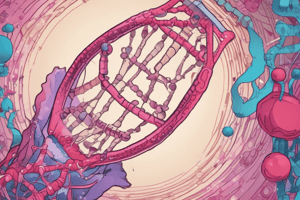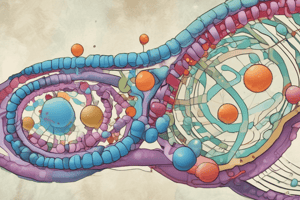Podcast
Questions and Answers
What is the reason why maternal blood should not be taken before 10 weeks gestation?
What is the reason why maternal blood should not be taken before 10 weeks gestation?
- There is too much fetally derived cfDNA in the maternal circulation before 10 weeks gestation
- There is not enough fetally derived cfDNA in the maternal circulation before 10 weeks gestation (correct)
- The placenta has not undergone apoptosis before 10 weeks gestation
- Taking maternal blood before 10 weeks gestation can harm the fetus
What does a D positive test result in non-invasive cell free fetal DNA testing mean?
What does a D positive test result in non-invasive cell free fetal DNA testing mean?
- All fetuses are predicted to be D positive
- The mother is RhD positive
- The mother is RhD negative
- At least one fetus is predicted to be D positive (correct)
What is the advantage of using non-invasive cell free fetal DNA testing to determine fetal blood group for RhD negative pregnant women?
What is the advantage of using non-invasive cell free fetal DNA testing to determine fetal blood group for RhD negative pregnant women?
- It is less expensive than invasive testing
- It offers an improved and more efficient service (correct)
- It can be done earlier in gestation
- It is more accurate than invasive testing
Flashcards are hidden until you start studying
Study Notes
Studying That Suits You
Use AI to generate personalized quizzes and flashcards to suit your learning preferences.




